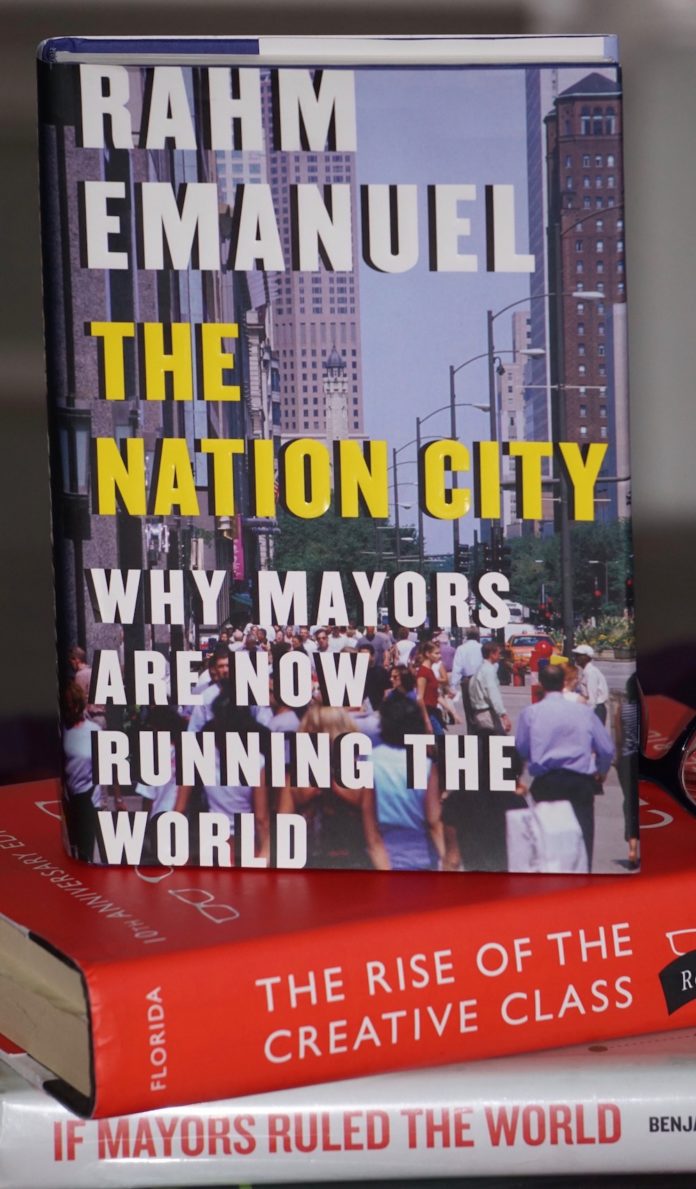Review: The Nation City – Why Mayors Are Now Running the World, by Rahm Emanuel, 2020, 235 pp., Alfred A. Knoph
America’s first death attributed to COVID-19 came only last Feb. 26, in Seattle, Wash. Intriguingly in retrospect, this was one day after a book was published, Nation City – Why Mayors Are Now Running the World. The juxtaposition of the two February events was coincidental. It was not, however, incidental.
Nation City, by former Chicago Mayor Rahm Emanuel, in fact foreshadowed the dynamism of local governance that would soon be on display. And he laid out the context for what was to ensue as local and state governments quickly outpaced the response of America’s national leadership to confront a global pandemic.
The fact that we can prepare for what we cannot fully anticipate – particularly in this liminal space between a viral outbreak and hoped-for immunity – is probably the most important takeaway of this important book. Sure, the planning for a pandemic by cities was inadvertent. Coalitions of cities now mobilizing to exchange testing methods and strategies were first forged around collective action a decade ago to confront climate change. Quick action to quarantine and protect the homeless grew from existing local initiatives well underway. Food bank expansion and distribution of meals to the displaced is growing out atop networks created by municipalities and NGOs for local food production and farmers’ markets. Virtual resources, from app-based guides to essential services to predictive modeling of viral spreading by neighborhood, emerged from cities already deploying “smart” data gathering and usage.
Similarly, pandemic planning wasn’t Emanuel’s intention or focus when he penned Nation City a few months after wrapping up two terms in the Windy City. But however inadvertent, consider a passage about keeping urban infrastructure up and running at a time of federal neglect; it could equally describe the responses of many a city to the crisis now upon us:
“It’s a perfect illustration of what is going on around the globe right now, a huge and very consequential shift in the way the world works. National governments across the developed world have become weak, ineffective, paralyzed, dysfunctional, and those are just a few adjectives to describe what’s going on. That’s created a vacuum. But while the national governments are receding in their role, cities and their mayors are putting up points on the board. Cities and their mayors have increasingly been required to fill that vacuum. They are the ones who are actually getting things done.”
Indeed, amid the COVID-19 crisis it is mayors who are getting things done. From Austin to San Francisco to Sioux Falls. And from Sao Paulo to Madrid to Mogadishu. Yes, some national governments deserve attention and praise for their handling of the pandemic. Germany and South Korea stand out, as well as smaller states such New Zealand and Austria.
Cities, though, are where the governmental rubber meets the road. And their action so vivid during this pandemic reflects a new global rising of cities and urban governance that has long been underway.
The contrast in effectiveness across the hierarchy of governmental levels has certainly been highlighted by governors in the United States – both in locking down the country and now, however controversially, in opening it back up. But the looming face of this new governance imperative is local. Or more precisely, it is globally aligned and internationally interconnected local governance.
Examples of this abound, and we’ve been exploring many of them here as part of our series Renewal. Austin’s mayor led Texas in shelter in place. San Francisco led California’s response, now credited for the city’s low per capita infection rate despite a population density comparable with New York’s. In South Dakota, it was the mayor of Sioux Falls who shut down the nation’s pulsating hub of rural infection then emanating from a slaughterhouse.
Globally, the story is often the same. In Brazil, the leaders of Sao Paulo and Rio de Janeiro have been far ahead of the country’s president in ordering social distancing, getting medical care to those in need, and securing food aid for the poor and refugees. In impoverished Somalia’s Mogadishu, the mayor has managed to deploy hundreds of portable hand washing stations despite an ongoing civil war.
In Spain, the mayors of the country’s seven largest cities have collectively moved to leverage massive investment in infrastructure toward jobs creation as a response to the displacement of COVID-19. These are steps mirrored in Austin where the city is mulling the creation of a local plan modeled on the Depression-era Civilian Conservation Corp.
This is not happening in a vacuum.Which is why Nation City is so valuable as a primer on the recent origins and evolution of this spirit of innovation and urgent improvisation.
From riverfront restoration to funding tactics for infrastructure to initiatives to boost educational success among Chicago’s poor, Emanuel draws on a wealth of insight and an inventory of anecdote to make the case that – however counter-intuitive it might seem – global leadership now emanates from city halls and not national capitals. He even coins a good term for it, “Nation City,” a phrase that captures the new essence of urban governance – not to mention serving as a catchy book title.
Some of the innovations explored and shared by Emanuel are relatively simple, such as using libraries as ad hoc counseling centers for immigrants – both documented and undocumented. Or replacing traffic lights with roundabouts.
But others reflect the changing role of cities wrought by the digital revolution. City-sponsored jobs training and community college scholarships focus on computer programming, while at another level Chicago has promoted cutting edge research and collaboration between universities around the world to incubate the city’s tech economy.
There are inspiring examples of innovation internationally as well. From London’s new economic development plan to cope with Brexit, to Milan’s coupling of university expansion with inner city redevelopment, to a host of food security initiatives undertaken by the mayor of the Philippines city of Zamboanga.
Which is not to say that Emanuel was the first to notice this shift and hail the fast-changing role of urban governance. His book, in fact, is part of an emerging intellectual canon. Foundational is certainly the work of Richard Florida, who authored The Rise of the Creative Class, published in 2002. This was refined by Jeb Brugmann’s Welcome to the Urban Revolution – How Cities Are Changing the World, produced in 2009. More critical to this understanding is the work of the late Benjamin R. Barber, who published If Mayors Ruled the World – Dysfunctional Nations, Rising Cities in 2013. Cities of Knowledge, by Margaret O’Mara, expanded the aperture to technology hubs, such as the Silicon Valley, Seattle or Austin in 2013. No work on this transformation is as detailed and granular as The New Localism – How Cities Can Thrive in the Age of Populism by Bruce Katz and Jeremy Nowak and published in 2017. Last year, a masterful perspective adding to this canon, The City as a Geopolitical Actor, was published by a team of European academics led by sociologist Stijn Oosterlynck.
Emanuel’s work, however, is really the first by a practitioner. He is not a scholar, a journalist, nor an urban sociologist. He’s a pol, and a street-smart Chicago pol at that. At times Nation City’s tone annoyingly reflects this politicking dimension. Emanuel is hardly shy about claiming credit for every success on his watch while distancing himself from the failures, notably including runaway gentrification. The intractable issues of equity in our cities, explored so well in our Renewal pages by Austin activist Susana Almanza, get at best a cameo appearance here. The promise of data usage by cities, the subject of a “smart cities” essay for this Urbānitūs series by Chelsea Collier, gets more of a nod, but only as it relates to the use of these technologies by police. Emanuel focuses intensely on the importance of airports but ignores the emergence of autonomous vehicles, which are likely to prove far more transformative in the future of urban transit. His vision is still, well, very 20th Century when that of so many of his peers in the world’s city halls are envisioning how they will shape the 21st.
But he suffers no shortage of street cred with which to discuss the ongoing swap-out of authority and effectiveness between national and local leaderships. He served in the Bill Clinton White House, leaving to successfully run for Congress. He was then to resign his House seat to become Barack Obama’s chief of staff before his 2011 election to run the Windy City.
His is also a breadth and depth of experience that allows him to issue, along with the celebration of new civic authority and power, a warning to urban leaders that the fight for the future is still theirs to win.
“Today our federal government is a defense budget that also pays Social Security, Medicare, and Medicaid,” he writes. “If cities are not careful, they, too, could become a public safety budget that pays pension and health care costs, crowding out all investments in education, libraries, parks, and transportation.”
So, sage counsel throughout, practical and handy as cities around the world face not just policy and service challenges but the ravaging of tax bases and plummeting revenue.
The book is worth the reader’s indulgence in Emanuel’s self-indulgence. He brings a great deal into a new and vitally-needed focus in an era when governments at all levels are strained to the breaking point. It comes as the challenges of COVID-19 are inevitably devolving on to the shoulders of local leaders.
Buy this book with a click to your local bookseller:If you like what you’ve been reading, please click here to subscribe and we will send you updates and our newsletter.







